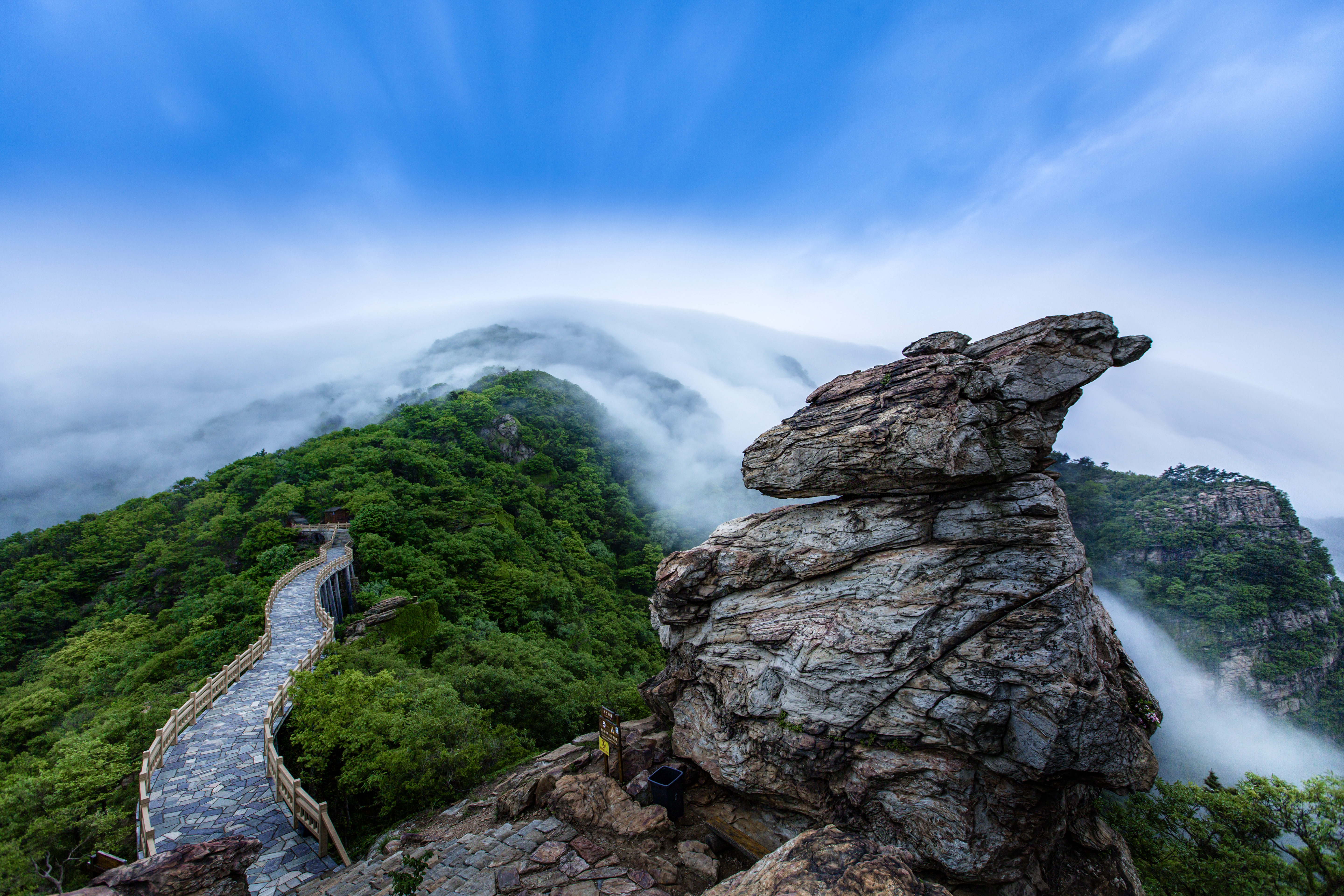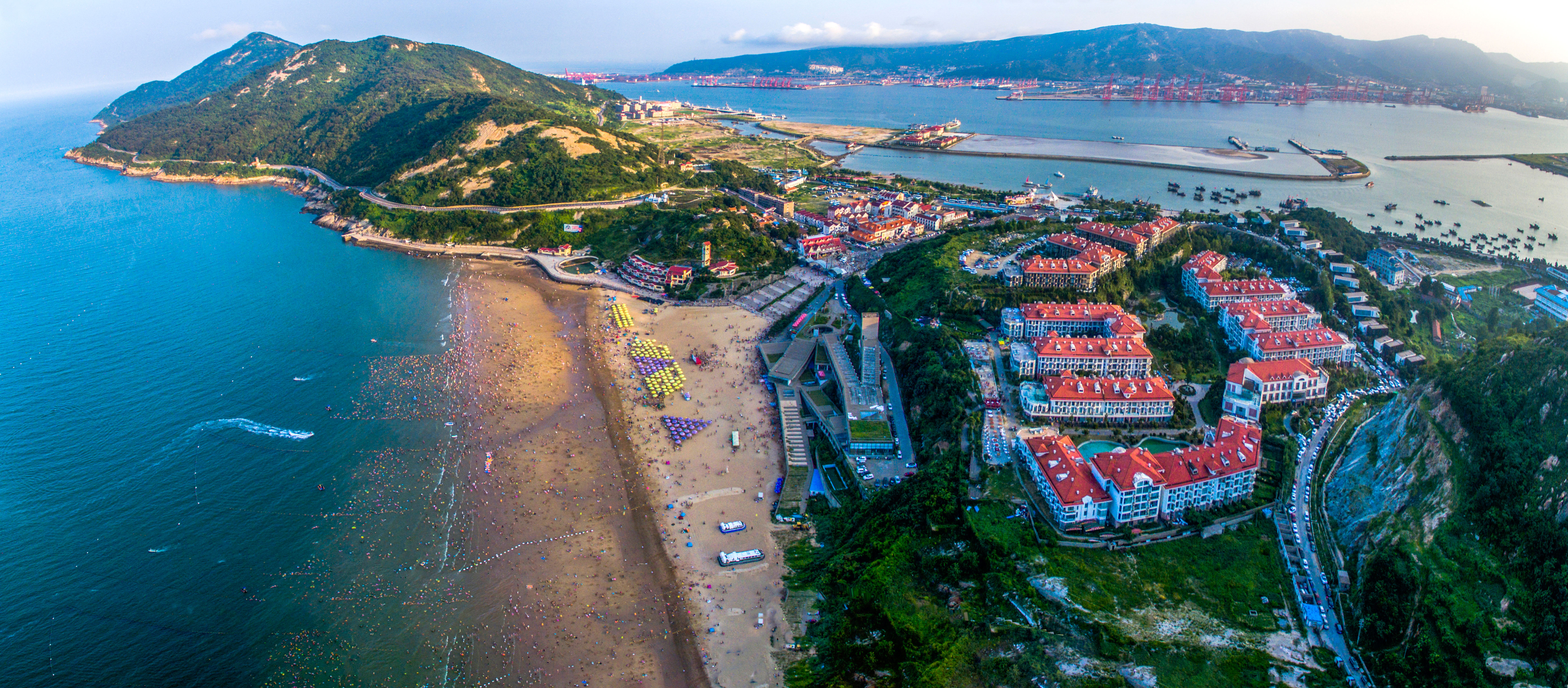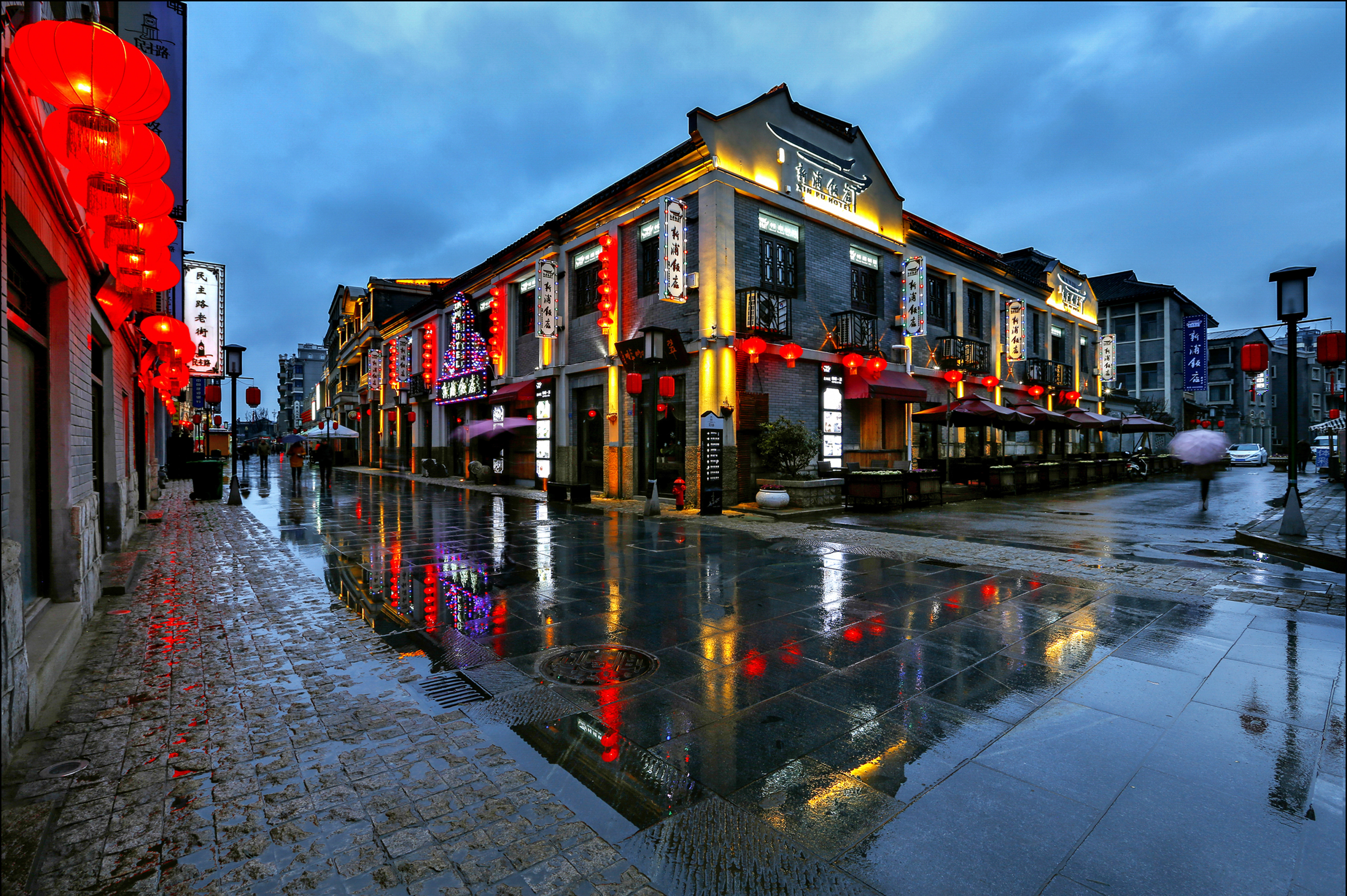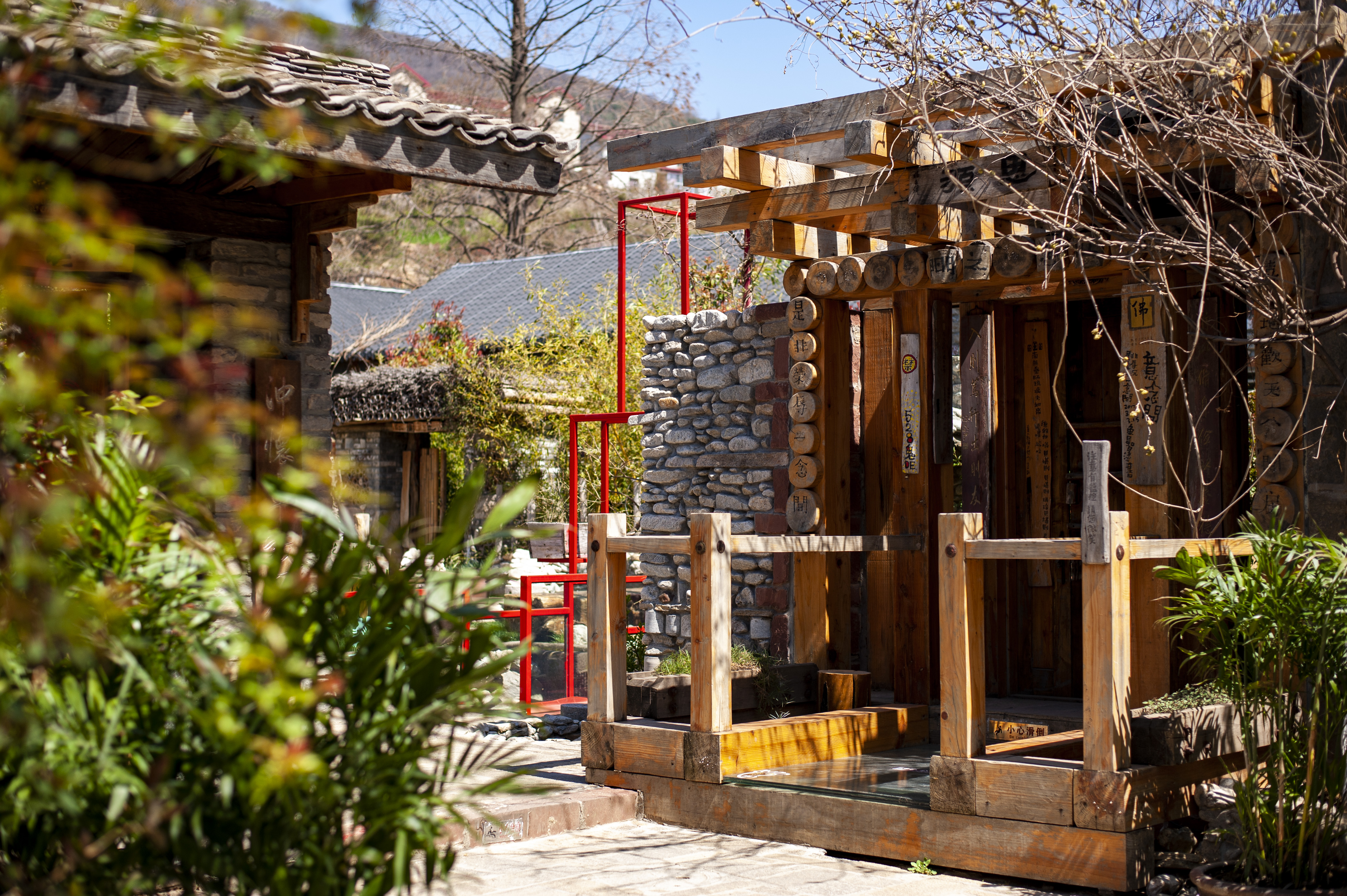Lianyungang, a city on the Yellow Sea coast, boasts the most beautiful coasts and beaches in Jiangsu province. Walking in the city is just like traveling in a fairyland described in myths as the mountains, which are the background of the city, are stretching far to link with the vast ocean; however, if you step into the hustling and bustling urban area, you’ll notice the human touch of daily life everywhere.
Mountains and Ocean in Clouds and Mist
In the refreshing morning, as a ray of sunlight shined through the window, we see tweeting birds flying in the sky. Standing far away, looming in the clouds and mist, is the Yuntai Mountain. As China’s old saying goes: Morning hours is the best time of the day. Therefore, guided by the morning sun, we head for the top of the mountain.
You can either walk up the mountain or take the shuttle bus. With the latter, you can enjoy the breeze and the beautiful view while climbing up the zigzagging mountain highway, and you won’t be too tired when you finally reach the top to feast your eyes with the picturesque view. On the mountain, birds whisper and insects sing. There are still some morning dews on the trees, and the air is extremely fresh. No matter from which angle on the top of Yuntai Mountain, you can have a sweeping view of the harbor at the mountain foot. If it’s the first time to enjoy the view, you’ll be amazed by the delicate harmony between the busy port and the quiet mountain forests. There are 3 stops on the way down the mountain by bus, including Faqi Temple, Wudao Temple and Tao Yuanming Cultural Park, which are ideal choices for appreciating the humanity history. However, if you decide to walk down the mountain, you’ll have other choices. Besides taking the old way back, you can also go down the mountain from the east side, to reach the Lianyungang Old Street. This architecture complex at the foot of the mountain is located right in the middle of the port and the Yuntai Mountain on the sea. The old street has a distinctive style, reminding people of the Republican period. The staggered stone slabs are lined up along the mountain. The shops on the street sell specialty products and local snacks, and some people carry the pole and baskets to sell the fruits picked up in their own gardens. In here, a place where the nature and the industry are integrated, you’ll see trivial matters of daily life and also many warm and assuring moments.
There are 3 stops on the way down the mountain by bus, including Faqi Temple, Wudao Temple and Tao Yuanming Cultural Park, which are ideal choices for appreciating the humanity history. However, if you decide to walk down the mountain, you’ll have other choices. Besides taking the old way back, you can also go down the mountain from the east side, to reach the Lianyungang Old Street. This architecture complex at the foot of the mountain is located right in the middle of the port and the Yuntai Mountain on the sea. The old street has a distinctive style, reminding people of the Republican period. The staggered stone slabs are lined up along the mountain. The shops on the street sell specialty products and local snacks, and some people carry the pole and baskets to sell the fruits picked up in their own gardens. In here, a place where the nature and the industry are integrated, you’ll see trivial matters of daily life and also many warm and assuring moments.
Embrace the Sea
The next stop is the real seaside. From the port to the Zaihaiyifang Park, the vast sea is within the view all the way, but if you’re seeking for the best seaside view, Liandao is the right place. Many parents would take their kids to tread water in the Zaihaiyifang Parkor dig with small shovels for beautiful shells. Then, by taking a bus along the west embankment (Xi Da Di), you can reach Liandao. Before you come here, you may think that Liandao is a place specially for tourists, but actually there are native fishermen. You’ll see original fishing villages, just like they are primitively. In front of the houses with side-by-side red walls and white tiles, the villagers are relaxing in cool places or chitchatting with neighbors, forming a impressive contrast with people wearing swimsuits and swim rings. Dashawan, where you can see the great ocean stretching away to meet the sky, is the first spot that comes into sight in the Liandao Scenic Area. You can take off their shoes and step on the soft sand, and walk into the sea to play hide-and-seek with the waves hitting the shore. The sandy beaches of Liandao are not continuous. You need to pass through a 5-kilometer seaside plank road to arrive at Sumawan, usually by a sightseeing car, riding on which you’ll enjoy the breeze of the sea. Compared with Dashawan, Sumawan is more secluded for having mountains and forests right behind it, as if no one knows that this place even exists. Suddenly, with a whistle heard on the beach, groups of peacocks leaped down from the mountain, presenting a spectacular scene, reminding people of the poem “The Peacock Flies to the Southeast”. As the setting sun gradually slants and the temperature gets lower, there will be a bleak feel on the beach. At this moment, the coldness will be gone if you can have a nice chat with several of your good friends over a couple of beers on the beach.
Dashawan, where you can see the great ocean stretching away to meet the sky, is the first spot that comes into sight in the Liandao Scenic Area. You can take off their shoes and step on the soft sand, and walk into the sea to play hide-and-seek with the waves hitting the shore. The sandy beaches of Liandao are not continuous. You need to pass through a 5-kilometer seaside plank road to arrive at Sumawan, usually by a sightseeing car, riding on which you’ll enjoy the breeze of the sea. Compared with Dashawan, Sumawan is more secluded for having mountains and forests right behind it, as if no one knows that this place even exists. Suddenly, with a whistle heard on the beach, groups of peacocks leaped down from the mountain, presenting a spectacular scene, reminding people of the poem “The Peacock Flies to the Southeast”. As the setting sun gradually slants and the temperature gets lower, there will be a bleak feel on the beach. At this moment, the coldness will be gone if you can have a nice chat with several of your good friends over a couple of beers on the beach.
Colorful Nightlife of the Old Street
Most people are heading to the downtown area during the night, and there is few people left on the beach as it’s getting darker. The downtown area is often busy at this time. During the daytime, Minzhu Road and Yanhe Alley are characteristic streets of the republican-period style. The former is full of centuries-old shops, and a lot of antique lovers communicate and do trades here, mostly the middle-aged and the elderly. The latter is a commercial street, which is the first choice for young people to go shopping. Yanhe Alley is next to the Salt River (Yanhe). There are sculptures about salt production and transportation on the street, showing the history of the salt industry in Lianyungang. While at night, tables and stools will be moved to the street, and fresh seafood will be neatly placed in the very front, marking the start of nightlife. People gather to have nice dinner and drinks, as well as chat with each other, presenting a nice and attractive view of the colorful nightlife here. Live in the Mountains and Forests
Live in the Mountains and Forests
It’s time to rest after drinking and eating to satiety. Following the lively bazaar, the next stop is Sucheng Town at the foot of Yuntai Mountain. Tao Yuanming, a famous poet in ancient China, once led troops to arrive at Hukouling in Sucheng. He wrote the experience of admiring the pastoral life of the “peach blossom forest” and numerous footpaths in the field into “Peach Blossom Spring”, a well-known essay that has been passed down to this day. Bajianfang (the Eight Rooms) is one of the most characteristic homestays in Sucheng. The houses were built along the mountainous terrain, transformed from tile-roofed houses with stone-wall built by locals, with limited distance from each other. Paths paved with cobblestones reach the door front of every house. Behind the window is the mountain, flowers bloom in the courtyard, water flows in front of the door, and the waterwheel runs on the flow of water. Old stones were paved in the road, on flower beds, into table surface, and pots and pottery jars are stacked on top of each other to form a colorful wall, as if telling a romantic legend. You may push open a wooden door, walk into your “own” yard, spend a quiet night in a small bungalow, breathing the fresh air of Yuntai Mountain, listening to the romantic stories of Sucheng, and gradually falling asleep.
